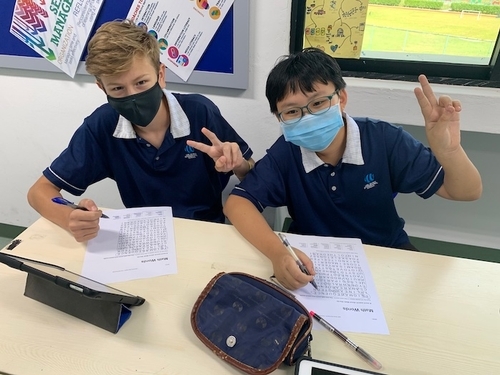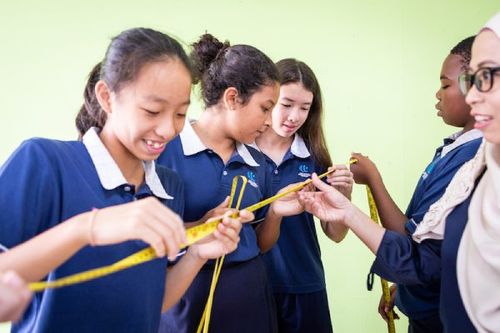We know that Mathematics is an important subject, and it’s the basis for so many of our endeavours and disciplines. This is even for students who won’t be pursuing a great deal of higher education in a maths-related field need competency in the subject. But why on earth does it seem to be so boring to so many students? In traditional classrooms, it’s common to hear students say, “Why do I need to memorise these maths equations and formulas? I’ll never use them again.”
But in reality, maths is a beautiful, fascinating and engaging subject. Everything depends on how it is taught and how we, as teachers, can engage students in actively learning mathematics. It isn’t the subject that’s the problem. The tasks students have traditionally been asked to do to learn and practice maths are the ones that cause confusion and boredom. That’s why we address maths in a different, far more engaging way in our secondary school grades at OWIS. We adapt our subject material for the multiple intelligences of our secondary students, so they gain confidence and lifelong interest in this interesting subject.
Catering to Multiple Intelligences from a Maths Context

I’ve always been fond of a quote from Albert Einstein, who said, “Everybody is a genius, but if you judge a fish by its ability to climb a tree, the fish will live its whole life thinking that it is not intelligent.”
In the same way, a fish swims beautifully in water, so will some students excel at some forms of learning and thinking. Recognising and responding to multiple intelligences enables all students to engage with a subject in their own way and to each, also excel in their own manner.
Developmental psychologist Howard Gardner proposed the theory of multiple intelligences in the 1980s, and it has proven to be a valuable tool in the classroom as well as throughout life. Each person has a combination of these intelligences, and the concept helps us broaden our view of learning and personal growth.
There are eight broad categories of multiple intelligences identified by Gardner:
- Bodily / Kinesthetic – Coordinating your body along with your mind
- Linguistic – Being able to put complex concepts and feelings into words
- Logical / Mathematical – Quantifying things, making hypotheses, and proving them
- Musical – Discerning sounds, their pitch, tone and rhythm
- Naturalist – Understanding living things and nature
- Spatial – Visualising the world in three dimensions
- Intrapersonal – Understanding yourself, your feelings and your own interests
- Interpersonal – Understanding the feelings, motives and interests of others
It’s easy to see from these intelligences how mathematics instruction in the past and other school subjects focused on logical/mathematical intelligence and linguistic intelligence. Professor Gardner himself noted that these types of intelligence were focused on the most in school and society. Yet with common sense, we can all see that all of the intelligences not only have value, but we all each have abilities and strengths in more than one of the multiple intelligence areas.
Ways to Engage Different Intelligences at OWIS in the Secondary Maths Curriculum

There are many new and effective teaching methods for maths emerging all the time, but here are some of the methods that engage multiple intelligences that we would consider effective in our secondary classrooms at OWIS:
- Engaging interpersonal intelligences: We include group presentations where each student plays a role to help the entire group and the rest of the class learns and reinforces maths skills and concepts.
- Engaging spatial intelligence: Spatial intelligence is closely related to vision and visual perceptions. We can use a balance-beam apparatus to show how equations are physically and visually balanced in algebra. Using coloured objects also helps to teach geometry and equations that define relationships or shapes and forms.
- Engaging spatial and bodily/kinesthetic intelligences: We can use paper folding and other techniques to help students solve linear equations. For example, students can solve equations like 4x – 2 = 6 by creating a number line with equal spaces from -2 to 6 and then folding it equally. When unfolded, the number of “blocks” or folds can easily be seen and determined. Different folding sequences can help solve different problems, and the process engages both spatial and bodily/kinesthetic intelligences.
- Engaging naturalist intelligences: You have probably heard of Fibonacci numbers and the Fibonacci spiral, and if you haven’t, you have undoubtedly seen it, as it constantly appears in nature as well as human design and architecture. We can use the spiral of a growing seashell to show how the ever-growing series of squares and curves that create the shell can be reflected in the Fibonacci number sequence.
- Engaging musical intelligences: We can engage musical intelligences with mathematics in many ways, and the relationship of music to maths has been well-documented. As a simple example, we can engage students in calculating beats per minute in samples of instrumental music.
- Engaging linguistic intelligences: We can relate the rhyme and meter of poetry to maths, and we can ask learners with strong linguistic skills to create word problems. Presenting these problems to the class as a whole, perhaps as part of a group, will also engage interpersonal intelligence and skills.
Traditionally, and you may well remember this from your high school or middle school experiences, maths instruction relied almost exclusively on logical/mathematical intelligence. It is so much more engaging and rewarding for all students to approach maths from a perspective of multiple and diverse intelligences.
Maths Morning at OWIS is Fascinating

On Maths Morning at OWIS, which is an annual celebration of the subject throughout the school, our secondary school teachers usually take a transdisciplinary approach to mathematics to showcase how maths touches all aspects of our lives and learning. In 2021 on Maths Morning, we combined English and History when we looked at the great mathematicians from across the globe. In this way, students learned about the contributions of all nations and figures in history to mathematics.
Some students may also sometimes find geography boring, but we combined data that shows our world as it constantly changes and evolves. This helped them understand how our world is interrelated in trade, travel, environment and weather.
Our science teachers introduced students to the Golden Ratio, and students discussed how this ratio appears nearly everywhere, in architecture and engineering as well as in nature and even people’s faces. English teachers contributed to the story by covering word problems with students to work out how they are related in the English language and in Maths.
While Maths morning is a special day that usually falls in March, OWIS teachers ensure that students are familiar with the real-world applications of maths throughout the academic year.
Making Maths a Vital Subject for all Students
At OWIS, we know that making maths an interesting subject to match its importance and usefulness relies upon a combination of relevance, common sense and creativity. We let students know that maths is meaningful and important, always explaining to students why they practice a concept or learn a new skill. We focus on concrete skills, too, and always include concrete examples of how a maths skill solved a problem, from velocity and acceleration to angular momentum.
Formulas from a textbook have little meaning to many students, but when we can present them with real-world problems to solve, such as water or food shortages, the formulas become both more exciting and engaging.
Above all, we believe that our students at OWIS should be able to exercise their creativity and take ownership of their learning. This is what enables us to engage maths students and help the subject come alive. We always believe that students should be asked to discuss their work and learning. We are open to their feelings and ideas and use their feedback to continue creating and deploying new, creative, engaging assignments in maths, supporting all of our diverse students to learn and grow. We find that these strategies fully support the learning goals of the IB Diploma Programme and IGCSE mathematics curriculum.
If you’re interested in learning more about our Secondary School curricula and how we engage learners through creative and inquiry-based techniques, please contact us.
(This blog was originally written in collaboration with Mr Ong Jun Liang (Ryan), former Maths Teacher, OWIS Nanyang.)














